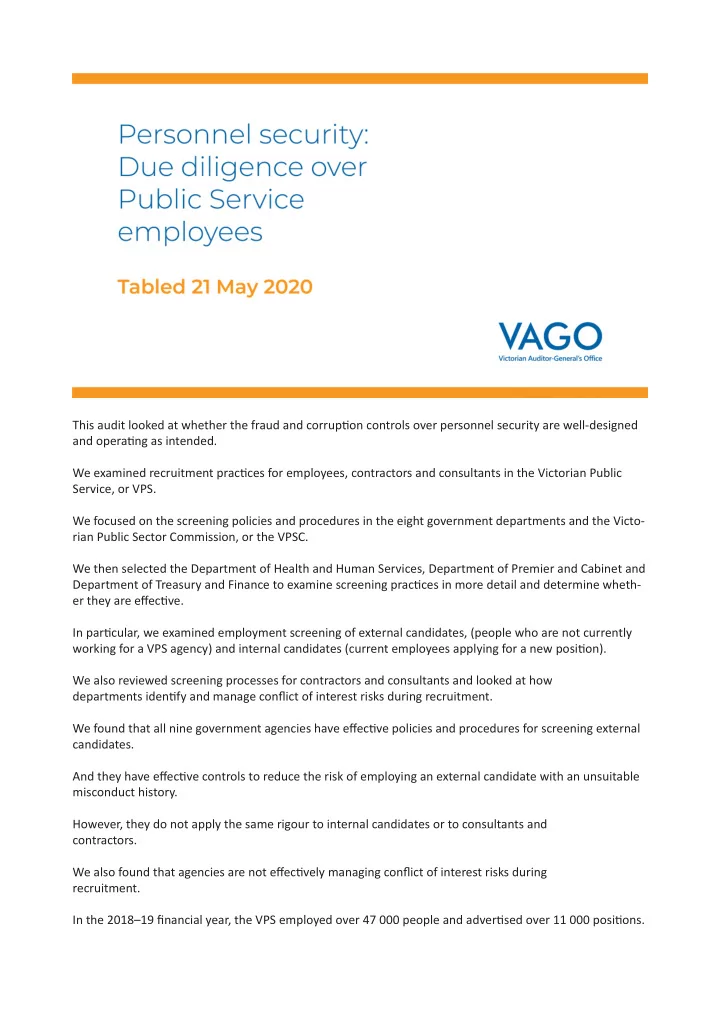

This audit looked at whether the fraud and corruptjon controls over personnel security are well-designed and operatjng as intended. We examined recruitment practjces for employees, contractors and consultants in the Victorian Public Service, or VPS. We focused on the screening policies and procedures in the eight government departments and the Victo- rian Public Sector Commission, or the VPSC. We then selected the Department of Health and Human Services, Department of Premier and Cabinet and Department of Treasury and Finance to examine screening practjces in more detail and determine wheth- er they are efgectjve. In partjcular, we examined employment screening of external candidates, (people who are not currently working for a VPS agency) and internal candidates (current employees applying for a new positjon). We also reviewed screening processes for contractors and consultants and looked at how departments identjfy and manage confmict of interest risks during recruitment. We found that all nine government agencies have efgectjve policies and procedures for screening external candidates. And they have efgectjve controls to reduce the risk of employing an external candidate with an unsuitable misconduct history. However, they do not apply the same rigour to internal candidates or to consultants and contractors. We also found that agencies are not efgectjvely managing confmict of interest risks during recruitment. In the 2018–19 fjnancial year, the VPS employed over 47 000 people and advertjsed over 11 000 positjons.
VPS work can involve managing public assets, accessing sensitjve informatjon and fjnances, and providing critjcal services to the Victorian community, including to vulnerable people. So every candidate applying to the VPS must undergo employment screening appropriate to the risk of the positjon. Common screening types include identjty, police, qualifjcatjon, reference and right to work in Australia checks. There are also role-specifjc checks, such as for working with children. All agencies have clear policies and procedures to ensure that external candidates complete police checks. At DHHS, DPC and DTF we found over 90 per cent of new employees had a police check. Agencies also have fair and thorough processes to assess a candidate’s suitability when a check reveals a criminal history. However, seven of the nine agencies’ screening policies and procedures for internal candidates were either unclear or lacked detail regarding police checks, meaning that internal candidates may not have a police check regardless of the risk of the positjon they are applying for. We also found that contractors ofuen have not had a police check before startjng work in the VPS. A sample of 299 contractors engaged between 1 July 2017 and 30 June 2019 via the staffjng services whole of government purchasing agreement showed approximately 40 per cent had a police check. DPC and DTF are currently negotjatjng new whole of government purchasing agreements for contractors and consultants. This is an opportunity to strengthen screening policies and controls. Reference checking is a critjcal step in recruitjng. All agencies require two reference checks for external candidates.
We found insuffjcient evidence to confjrm that DHHS, DPC and DTF consistently do this, but this may be due to the poor record keeping practjces we observed. We also found that some departments do not require reference checks for internal candidates at all. Victorian integrity organisatjons have highlighted the risk that employees with misconduct histories can move through various VPS positjons, without their misconduct histories being known. We examined misconduct data and compared this to data for new starters from 1 July 2017 to 30 June 2019. We found that only 4 per cent of employees who had been terminated for misconduct, or resigned during a misconduct investjgatjon, had been re-employed at other audited agencies. During recruitment, agencies must identjfy, declare and manage confmicts of interest. This is to ensure that selectjon panels make fair decisions. Six of the nine audited agencies do not have thorough processes to ensure this happens before interviewing candidates. In December 2019, the VPSC published a mandatory pre-employment screening policy for the whole VPS. This is a positjve step towards a more consistent and thorough approach to employment screening. However, the policy mainly focuses on candidates’ misconduct histories and is not a consolidated and complete guide for VPS agencies. We made 13 recommendatjons. Four for the VPSC to improve its VPS-wide employment screening policy and guidance. Three for DTF and two for DPC to strengthen their employment screening requirements for contractors and consultants in whole of government agreements. And four recommendatjons to all nine agencies to improve both their screening practjces for internal can- didates and contractors and their procedures and training to manage confmicts of interest during recruit- ment. For further informatjon please view the full report on our website.
Recommend
More recommend